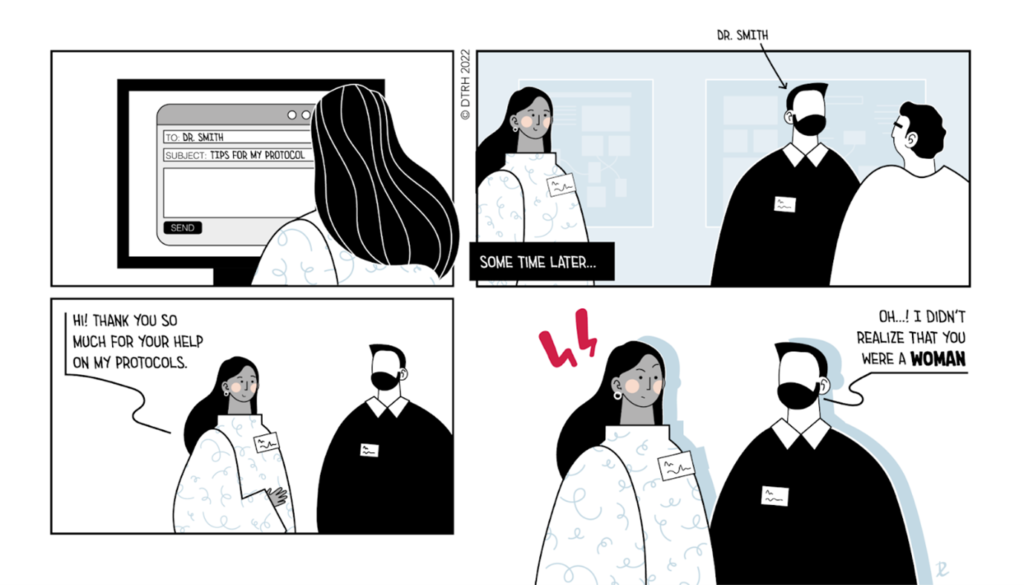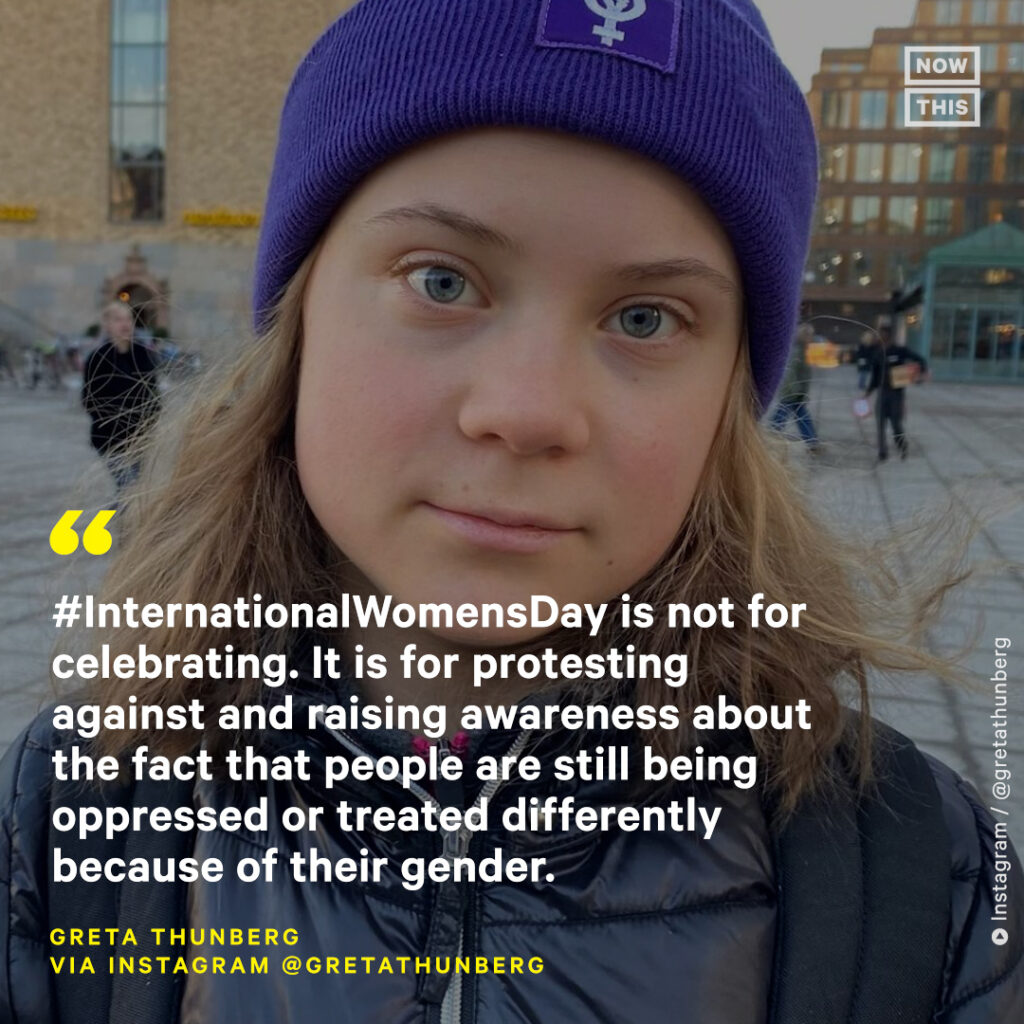It’s been just over two weeks since International Women’s Day (IWD) 2022, and in truth I feel a little bit deflated. As wonderful as it was to see the work of so many incredible females being celebrated, I can’t help but agree with Greta.
As I scrolled through Twitter I was greeted with the usual performative ‘Look at us supporting women’ posts. Although seemingly inspiring, in reality these were nothing more than a picture of a female employee and a few hashtags. Ok great so you have a female in the team, but what are you doing to support them? To provide them with the same opportunities as their male counterparts? To ensure they are treated and paid fairly? It turns out mostly not a lot, with many organisations (several universities included) failing to put their money where their mouth is. I came across a great page (@PayGapAPP) calling out gender pay disparities in response to IWD posts from organisations claiming to champion women. It would have been quite amusing to see them scramble to delete and amend their posts after being called out if it wasn’t so heart-breaking.
Something else I was struck by, but sadly not surprised at, was how the majority of posts I came across were from women. Yes, it’s International Women’s Day, but in my experience what women don’t need is more support from each other (something that is usually found in bucket loads). What we actually need is for our male friends and colleagues to use their voices to support us too. Our fight for equality should not rest on our shoulders alone, and quite frankly the problem isn’t our fault, so why should we be the ones constantly trying to fix it?
Misogyny is everywhere, always. It lurks in academic portraits hung on walls where women often cease to exist. It lingers in emails addressed ‘Hi guys’ or ‘Dear Sirs’. It strikes when equipment is taken out of a woman’s hand because ‘she needs help’. It stings with questions asked about childcare that aren’t also asked to male colleagues. The list goes on…and on. And if you don’t see it, you are part of the problem.

With risk of falling into an even deeper pit of despair, I want to direct this blog into something more positive. What can we do (all genders) to chip away and change these behaviours in both everyday life and an academic setting?
Here’s 5 things I think if we all made a little effort to do, we would see a huge difference.
1. Check yourself – Do you notice or consider the microaggressions women face on a daily basis?
Microaggression is defined as indirect, subtle, or unintentional discrimination against members of a marginalized group. In the case of women, this can range from unsolicited pet names and invasion of personal space to female colleagues having their skills underestimated because they don’t fit the stereotype in a male dominated career.
There’s a link to a great article here with some more examples. Have a flick through and make yourself familiar. Some of them you might have noticed before, and others might be new to you. By putting these on your radar, hopefully you will be more likely to notice them in real life scenarios. I see them on a very regular basis, so it shouldn’t take you long.
2. Call it out – Do you speak up when you see others treated differently because of their gender?
I read something the other day which really made me sit back and question myself, “just because someone is nice to you, doesn’t mean they are nice to everyone”. We can all be guilty of turning a blind eye to behaviours that don’t affect us, but it is precisely then when we should use our privilege to call out the differences in treatment between colleagues. I have definitely been guilty of this in the past. Although I’m sure being a woman and not having the confidence to question this in fear of being labelled ‘one of those’ has influenced this in part (internalised misogyny strikes again), it’s not an excuse and I need to do better. And likely, so do you.
3. Be inclusive – Think about how you address your peers. What kind of language do you use? Are you unknowingly dismissing your female colleagues?
I recently received an email from my solicitor that read: Dear Grace, immediately followed by Dear Sirs. When I responded politely but firmly that as my name hinted, I was a female, and that a more inclusive approach to addressing clients should be used, I was met with the response “It was a generic email and no offence was caused”. Yes, you read that right. As you can imagine, I didn’t take too kindly to this and was quick to reply, that offence was caused, and whether or not it was a generic email, my point still stood. Whatever the purpose of the correspondence, why are we still excluding other genders on something so fundamental as addressing another human being?
Perhaps this is an extreme example (it’s not, I’ve been addressed as Dear Sirs more times than you can shake a stick at), but what about ‘hey guys’? I used to say this all the time, and it wasn’t until a friend of mine questioned me that I thought anything more of it. It may seem trivial but imagine if everyone went round addressing mixed gendered groups as ‘hey girls’, you’d probably think that’s a bit odd, so why aren’t the same questions asked when it’s the other way around?
4. Change your behaviour – Ask yourself, if this was a man, would I behave the same?
The belief that women are weak and need protecting is known as ‘Benevolent Sexism’.
If you saw a man carrying something, e.g. field equipment, and they didn’t look uncomfortable or like they genuinely needed help, would you offer it? And if you did, but they declined, would you still insist? I’m not saying never ask a woman if she needs help again, just think about your motives in doing so first.
The same goes for the reverse. For example, giving validation to a female colleague for completing a task and not giving the same validation to a male colleague in the same position. This goes back to underestimating women, and being surprised when they succeed.
5. Show up – You don’t have to be perfect; you just need to try.
This is arguably the most important of my tips and the main take home point.
Misogyny is so deeply ingrained in society it’s impossible to change all of these things overnight. But by constantly questioning both your own and other’s behaviours and by making mistakes and learning, together we can start to see real change.
.
I want to highlight that these are my own thoughts and based on my own personal experiences. This is a nuanced subject, and the effects of misogyny are not felt equally between different ethnicities, sexualities, and gender identities. I of course cannot speak for everyone one who identifies as a woman and everyone is different, so bear that in mind. However, if you want to chat or have any questions, please feel free to get in touch.
.
This blog was written by Grace McNicholas, one of our EcoEvo Blog Editors.

